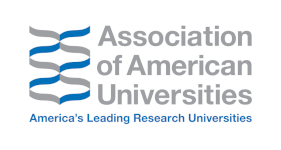 AAU Elects University of Illinois Urbana-Champaign Chancellor Robert J. Jones as Next Chair
AAU Elects University of Illinois Urbana-Champaign Chancellor Robert J. Jones as Next Chair
Earlier this week, AAU announced that its member presidents and chancellors have elected University of Illinois Urbana-Champaign Chancellor Robert J. Jones as chair of the AAU Board of Directors. As chair, Jones will help guide AAU’s work and serve as a spokesperson for the association, particularly on federal policy issues affecting research universities. Princeton University President Christopher L. Eisgruber was elected to serve as the board’s vice chair.
Jones has been chancellor of the University of Illinois Urbana-Champaign since 2016 and is the first African American to hold that position. He is also a renowned crop physiologist and a professor in Illinois’ Department of Crop Sciences in the College of Agricultural, Consumer and Environmental Sciences.
“We are at a defining moment in higher education,” said Chancellor Jones. “So I am very excited to take on this role as the nation and the world are looking to the leading-edge education, research, and innovation of AAU and our member institutions to shape a better future for our global society.”
 President Biden Honors Scientists, Many from AAU Institutions, With National Medals
President Biden Honors Scientists, Many from AAU Institutions, With National Medals
Last week, President Biden honored 21 individuals “who have made exemplary achievements in science, technology, and innovation to strengthen our nation’s well-being” with the National Medal of Science and the National Medal of Technology and Innovation. The medals are the nation’s highest honors for scientific and technological achievement. According to the White House, this year’s medalists “have made discoveries that enable lifesaving medical treatments, help fight the opioid epidemic, improve food security, advance accessibility, protect our democracy, and much more.”
Nine individuals received the National Medal of Science this year, including Huda Akil from the University of Michigan; Barry C. Barish from the California Institute of Technology; Gebisa Ejeta from Purdue University; Eve E. Marder from Brandeis University; Gregory A. Petsko from Harvard Medical School; Subra Suresh from the Massachusetts Institute of Technology and Brown University; and Shelley E. Taylor from the University of California, Los Angeles.
Thirteen individuals were awarded the National Medal of Technology and Innovation, including John M. Cioffi from Stanford University; Rory A. Cooper from the University of Pittsburgh; Ashok Gadgil from the University of California, Berkeley; Juan E. Gilbert from the University of Florida; Neil Gilbert Siegel from the University of Southern California; and James G. Fujimoto and Eric Swanson from MIT. In addition, Mary-Dell Chilton, who won a Golden Goose Award earlier this year, also won the National Medal of Technology and Innovation. She did some of her early research at the University of Washington and at Washington University in St. Louis.
Hill Update: Congress Back to Work on FY24 Appropriations
Last week, the House voted 220-209 to select Rep. Mike Johnson (R-LA) as the next speaker. Now with a speaker in place, the House plans to turn immediately to passing FY24 appropriations. Prior to his election, Johnson sent a letter to his colleagues outlining a plan to pass all remaining spending measures before government funding runs out on November 17. In accordance with his plan, the House approved the Energy and Water spending measure (H.R. 4394) last Thursday in a 210-199 vote. In the letter, Johnson also noted his openness to passing another stopgap measure, if needed, to extend government funding through January 15 or April 15.
Meanwhile, the Senate is still considering its three-bill spending package consisting of the Agriculture-FDA, Military Construction-VA, and Transportation-HUD measures. The Senate Appropriations Committee is also holding a hearing this week on President Biden’s emergency supplemental request to Congress to provide funding for several national security priorities, including for Ukraine, Israel, and border enforcement. President Biden has also asked Congress to fund an additional supplemental request to support domestic needs, including disaster relief, childcare, and broadband.
While the initial White House supplemental packages do not include science funding, Congress may modify the proposals before they are reconsidered by the House and the Senate. AAU asks Congress to include measures in the supplemental packages that fund critical scientific research, education, and STEM workforce development programs at the National Science Foundation and the Department of Energy Office of Science as authorized in the CHIPS and Science Act of 2022. As Sen. Chris Van Hollen (D-MD) told Politico last week, investments in science as provided in the CHIPS Act “are critical to jobs at home and our security around the world.” Congress must Fund American Science to ensure that our nation continues to be the world’s scientific, economic, and military leader.
 Senate HELP Committee Advances Bertagnolli’s Nomination as NIH Director
Senate HELP Committee Advances Bertagnolli’s Nomination as NIH Director
The Senate Committee on Health, Education, Labor and Pensions voted 15-6 last week to advance the nomination of Monica Bertagnolli as director of the National Institutes of Health. Bertagnolli is currently the director of the National Cancer Institute and has previously served as the Richard E. Wilson Professor of Surgery at Harvard Medical School and a surgeon at Brigham and Women’s Hospital in Boston. Five Republicans – Sens. Bill Cassidy (R-LA), Susan Collins (R-ME), Lisa Murkowski (R-AK), Roger Marshall (R-KS), and Mitt Romney (R-UT) – joined 10 Democrats in supporting her nomination.
Following the HELP Committee’s vote, AAU President Barbara R. Snyder sent a letter to leaders in the Senate encouraging them to take swift floor action to confirm Bertagnolli. President Snyder noted that Bertagnolli has “widespread support from over 100 NIH stakeholder organizations,” as evidenced by this June letter to congressional leadership lauding her qualifications. “We encourage you to schedule Senate floor consideration of her nomination as expeditiously as possible,” she said.
 GRAD Caucus Holds Congressional Briefing on Effective Mentoring in STEMM
GRAD Caucus Holds Congressional Briefing on Effective Mentoring in STEMM
Earlier this month, AAU joined the Council of Graduate Schools and the Graduate Student Council of the Massachusetts Institute of Technology in co-sponsoring the first congressional briefing of the Graduate Research and Development (GRAD) Caucus.
Launched last year, the GRAD Caucus is a bipartisan caucus in the House of Representatives that focuses on advancing policies and programs that benefit graduate student researchers. The GRAD Caucus is currently co-chaired by Reps. Gus Bilirakis (R-FL) and Zoe Lofgren (D-CA).
The briefing focused on effective student mentoring in science, technology, engineering, math, and medicine and was informed by a 2019 study conducted by the National Academies of Sciences, Engineering, and Medicine (NASEM) on “The Science of Effective Mentorship in STEMM.” AAU Deputy Vice President for Institutional Policy Emily Miller serves on NASEM’s Roundtable on Mentorship, Well-being, and Professional Development created to advance the study’s recommendations.
Speakers at the GRAD Caucus event included University of Wisconsin-Madison Professor Angela Byars-Winston and NASEM Director of Higher Education and Workforce Maria Lund Dahlberg. Both contributed to NASEM’s report on effective mentorship. They were joined by Noor Nakhaei, current president of the Graduate Student Association of the University of California, Los Angeles and Amy Huynh, vice president of the MIT Graduate Student Council. Nakhaei and Huynh spoke about the importance of effective mentorship and the impact negative mentorship experiences can have on graduate student research and degree completion.
The briefing outlined several policies federal research agencies and Congress could adopt to improve student mentoring, including requiring all federal agencies to ask for mentoring plans in grant progress reports; developing incentive structures to encourage effective mentoring; and increasing oversight over current mentorship practices.
Education Department Releases Final Rules on College Accountability and Consumer Protections for Students
The Department of Education released final regulations last week on “Financial Responsibility, Administrative Capability, Certification Procedures, Ability to Benefit.” The regulations will be effective July 1, 2024.
Broadly, the final rules allow the department to intervene in cases where institutions give warning signs of closure; require institutions to demonstrate that they are capable of administering federal student aid programs; allow the department to place conditions in written agreements it has with colleges to participate in federal student aid programs; and establish clearer processes for students without a high school diploma or equivalent to access federal aid. The rules also prevent colleges from withholding transcripts or academic credits for unpaid bills and require colleges to provide more detailed information to students about financial aid offers, including displaying the full cost of attendance and the net price that students and their families would have to pay. A Department of Education fact sheet on the rules is available here.
News of Interest
Pittsburgh Post-Gazette: New Pitt Grant Program Will Help Financially Struggling Students Finish Their Degrees – The University of Pittsburgh is launching the Pitt Finish Line Grant to provide financial assistance “to students who have financial holds and unpaid balances, and who are in the last two semesters of their undergraduate studies.” According to Pitt Chancellor Joan Gabel, the grant program will help direct resources “to those students who need them most and help ensure they graduate on time.”
The Chronicle of Higher Education: For the First Time Since the Pandemic Began, Colleges Saw Undergraduate-Enrollment Gains This Fall – New data from the National Student Clearinghouse shows that “undergraduate enrollment across all types of institutions” rose 2.1% in fall 2023 compared to last year. The data also showed, however, that first-year enrolment fell by 3.6% this fall, with the drops “concentrated in public and private four-year institutions.” Clearinghouse Executive Director Douglas Shapiro told reporters that it is “hard to know what’s really driving this divergence between freshmen and continuing students.”
The Texas Tribune: As Texas Bans Diversity and Equity Offices at Public Colleges, Rice University’s Inclusion Efforts March On – Starting next year, diversity, equity, and inclusion offices will be banned at public universities in Texas. Amidst the backlash against DEI initiatives, Rice University, a private institution in Houston, “is doubling down on its support of equity for all students regardless of their background or lived experience.”
CNBC: Biden Aims to Boost Investment in Clean Energy, Biotech, Semiconductors with Tech Hubs – The Biden administration announced last week that it has named 31 regions across the nation as technology hubs to “spur private investment and create jobs.” The hubs will focus on “fostering innovation” in industries such as “clean energy, artificial intelligence, semiconductors, [and] biotechnology,” among others. Funding for the hubs comes from the CHIPS and Science Act; many AAU members are involved in the tech hubs as leads or as partners.
Science: Women Leaders at Six Top Research Universities Urge More Diversity in Semiconductor Workforce – Women presidents and engineering deans from six research universities – all AAU members – have formed a new group aimed at diversifying the semiconductor industry workforce, which is expected to grow significantly as a result of investments from the CHIPS and Science Act. The EDGE Consortium argues that the semiconductor industry needs more women and minorities in its workforce in order to succeed and that increasing those numbers requires “removing barriers to entry, retention, and advancement” in academic programs designed to expand the workforce.
Featured Research

Being a Vegetarian May Be Partly in Your Genes
A new study by researchers at Northwestern University Feinberg School of Medicine suggests that “a person’s genetic makeup plays a role in determining whether they can stick to a strict vegetarian diet.” The researchers studied genetic data and found that three genes “are significantly associated with vegetarianism” and 31 genes “are potentially associated.” The study may explain why most people prefer to eat meat products.

A Sustainable Alternative to Air Conditioning
Researchers at McGill University; the University of California, Los Angeles; and Princeton University have published a new study that shows that redesigning a building to include materials that radiate heat from roofs or from indoor space to outer space can bring down interior air temperatures by several degrees. This method of “passive cooling” provides a sustainable alternative to air conditioning units that contribute to global warming.
From Our Feeds

Last week, AAU President Barbara R. Snyder and University at Buffalo (SUNY) President Satish K. Tripathy met with Senate Majority Leader Chuck Schumer (D-NY) to discuss the need for Congress to fund the science provisions of the CHIPS and Science Act.
Congress set forth a bold vision last year when it authorized significant funding increases for research supported by the National Science Foundation and the Department of Energy Office of Science as part of the CHIPS and Science Act. However, Congress has failed to appropriate most of that funding and is likely to fall more than $7 billion short in FY24 of the targets for scientific research set in the CHIPS Act. AAU calls on Congress to fulfill the promise of the CHIPS Act and to Fund American Science.